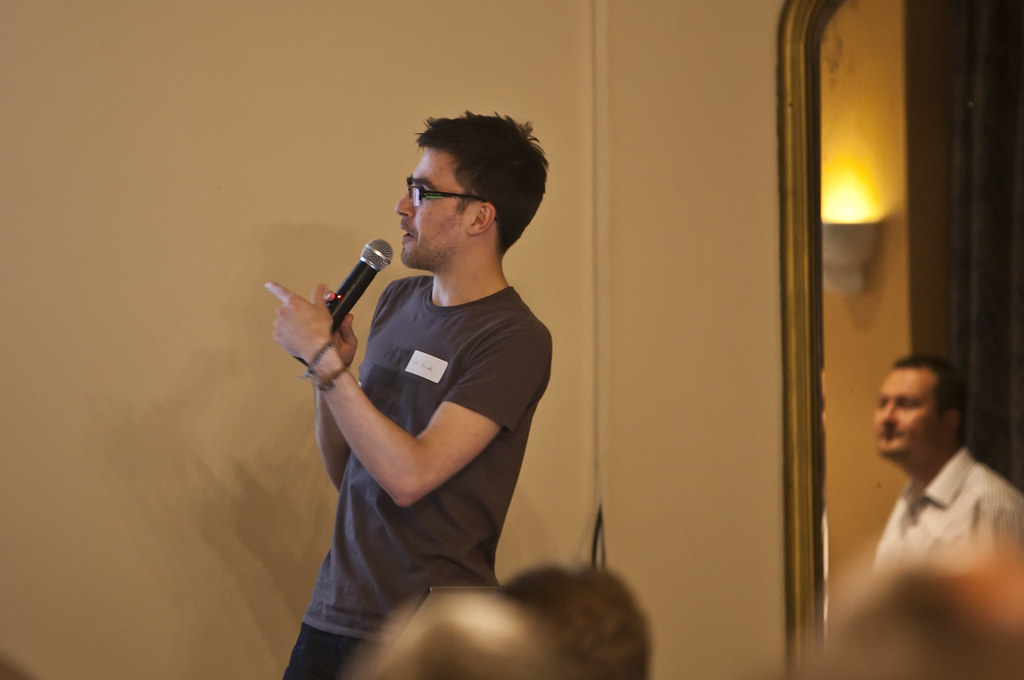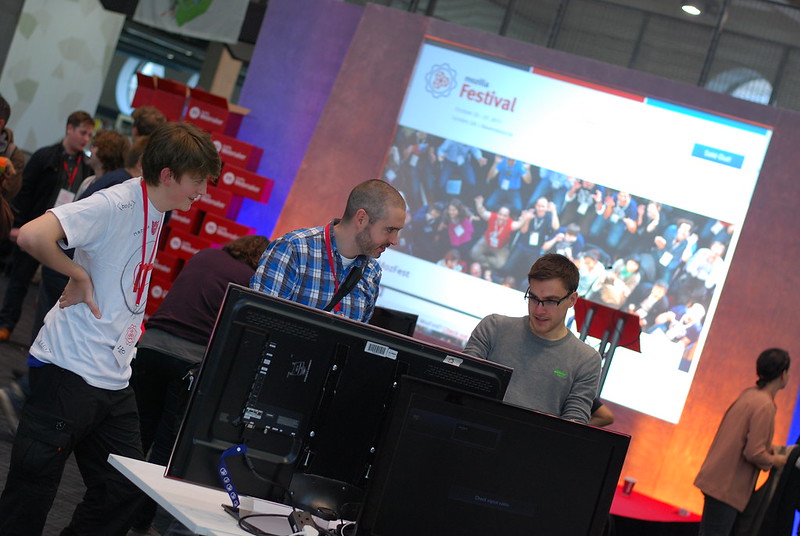Thoughts and advice for public speaking
In this entry I look back on my experience in public speaking and come up with some thoughts and advice on what makes a good talk.
Over the past few years I've had the opportunity to speak at a number of events all around the world, taking me from a terrified newbie to a (slightly-less terrified) professional. Here are some (unordered and rough) thoughts and tips on public speaking based on my experiences.
I will keep this entry updated as I learn new things.

- No one is perfect, don't make that your goal
- Focus on being happy with yourself and your own approach and style
- Try not to compare yourself to other speakers, everyone does things differently
- Other speakers will always look better to you than your perception of yourself (more composed, articulate, funnier, engaging, etc) – that doesn't mean you aren't any of those things
- Public speaking is scary shit, even the professionals get nervous
- Ask for feedback but don't take it personally or immediately apply it (some people love to be negative without being constructive, also everyone has a different opinion)
- Try and ignore the "great talk" comments – they're nice, but not constructive and don't help you get better
- Don't use humour as a crutch, you may get laughs but you'll dilute the real content

- Find a comfortable position for a headset mic and try not to fiddle with it for the rest of the talk
- Run the cable for headset and lapel mics down inside your top, that way you won't accidentally catch them and deafen the audience
- Don't hold a handheld mic like a rapper, you look stupid and no one can hear you
- Take your lanyard off before you talk, otherwise you may get it caught in the mic or your hands
- 99.9% of people are normal and will give you their time and attention and won't be dicks
- Given the chance, most people wouldn't want to be where you are (but wish they could)
- You have a huge amount of power as a speaker, people will listen to you and do what you say. Use it to your advantage.
- Stay calm and speak slowly
- Don't be afraid to pause for breath, to calm down, or to take a sip of water
- Related to above, make sure you have some water with you
- For you a pause may seem like a lifetime (especially with people watching) but in reality it's only a couple of seconds
- No one notices or cares if you pause or make a mistake
- Don't freak out or start apologising profusely if you make a mistake, just compose yourself and continue where you left off
- Try not to infer anything from the facial expressions and behaviour of the audience (weirdly, the most engaged people are often the ones who look most bored)
- Have a pee just before you talk, even if you don't particularly need one

- Keep your slides to a minimum (few words, no bullets, more images and visual triggers)
- Write notes to expand on the minimal slides that you can keep on your presenter display
- Don't stress about practicing, so long as you have good content and notes then you'll be fine
- However, make sure you keep to time as it's bad practice to go over and have to rush or end early (for me I give myself around 30 seconds a slide)
- Try not to get distracted and look at the big shiny screen behind you (trust that the slides work). Remember that you have power as a speaker and people will look where you look… you want their eyes and attention on you and not unnecessarily on your slides
- If you're a fiddler or walker-and-talker, try bringing something to hold to prevent you looking uncomfortable
- Bring a power cable and display adapter to the stage with you
- Don't rely on the Internet being available or reliable (have offline demos and videos)
- Don't live-code if you don't need to, it's cumbersome, error-prone (due to pressure of talking) and takes much longer than explaining pre-written code. If it's for a demo, use a video of you doing it (successfully) previously.
- Backup your slides on a USB and somewhere online (trust me, this will save you one day)
- Ask for the projector dimensions and general AV setup at the event before you make your slide deck

- As much as you can, talk about things that you are interested in and excited about (even if it's a 'boring' topic) – it's impossible to be bored if the speaker is obviously interested in what they're talking about
- You don't need a full-on story arc to your talk but have some structure with a beginning, middle and end
- Most importantly, try to enjoy it. Not many people get to do this and it's a great experience. You'll survive and you may even enjoy it slightly
- Use a decent remote control, ideally not Bluetooth- or WiFi-powered
- Record your talk and watch or listen to it back afterward, this is the best way to improve as you'll notice things like nervous ticks (for me, walking or rocking back and forth – yeah, weird), or repetitive phrases (for me, "erm", "like", "so…", "interesting", etc)
- Repeat questions back to the audience (so everyone can hear and it's clear you understood it)
- Don't be afraid to say, "I don't know" or, "I'll get back to you on that"
- If the answer to a question is going to be long, suggest catching up with them after the talk instead
- Put your slides online and mention that during your talk so people can focus and not have to take notes
I'm sure that's not everything but it's a good start for now. I'll update this entry as I think of things that I've missed.
In the meantime, I'd love to hear about any tips you might have learnt while speaking in public, or perhaps some questions you've got about speaking that I might be able to answer. Grab me on Twitter and I'll do my best to help!